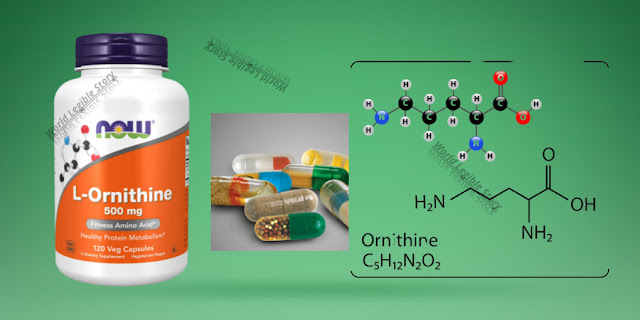-Benefits, Side effects, Dosage & more about it!
Background
L-ornithine, (L-aspartate) also known as (S) -2, 5-diaminopentanoic acid or ornithine, is a member of a class of compounds known as L-alpha-amino acids. Ornithine is a non-proteinogenic amino acid that plays a role in the urea cycle. this cycle helps rid our bodies of toxic ammonia by converting it to urea for excretion. It is a naturally occurring amino acid found in meat, fish, dairy and eggs, as well as in fruits such as nuts and grapes. Ornithine improves athletic performance. It has anabolic effects, including wound healing and immune-enhancing benefits for stress, lean muscle regeneration, detoxification and sleep.
Benefits or Uses
- Athletic performance: Amino acids are the building blocks that make up proteins. It is claimed to improve athletic performance.
- Anabolic effects: Both L-ornithine and glutamine are thought to have anabolic effects. They stimulate the body to build muscle and other tissues properly. Such amino acids may also have anti-catabolic effects, the researchers believe.
- The role of the urea cycle: It is one of the amino acids that make up 80% of the urea cycle in the body. This cycle helps our body to excrete toxic ammonia, by converting it into urea.
- Wound healing: Arginine supplementation, especially in collagen synthesis, is wound healing. L-Ornithine is the main metabolite of arginine in the urea cycle and shares many biopharmacological effects of arginine. This is probably why ornithine supplementation has an effect on wound healing.
- Immune: There is growing evidence that dietary supplements of specific amino acids for malnourished and infectious animals and humans increase immunity. One study in late 2016 found that it could increase the activity of “T cells” in immune cells.
- Other: Also, L-ornithine is responsible for increasing stress, detoxification, sleep, Skin and some other special benefits.
Technical Information
- Formal Name --- L-ornithine, monohydrochloride
- CAS Number---2184-17-2
- Molecular Formula---C5H12N2O2 • HCl
- Formula Weight---168.6
- Purity---≥95%
- Formulation---A solid
- Solubility---PBS (pH 7.2): 10mg/mL
- Storage---20°C
- Shipping---Room Temperature in continental for US.(may vary elsewhere)
- Stability---2 years
Side effects
If L-ornithine is accepted orally and by IV, it is normally safe. However, if the supplements are taken by injection, in some cases there may be a slight side effect for some people. These include nausea, vomiting, coughing, muscle cramps, diarrhea, and the like. There is nothing to be afraid of, this side effect is very rare.
Note: We need to keep in mind that any type of “supplement” is not just L-ornithine, but a “supplement” during pregnancy and lactation requires expert advice.
Dosage
For adults taking L-ornithine orally allow to use 9-18 grams per day for up to 3 months. The needle can be used 5-40 grams daily for up to 7 days. However, the level of supplement you are taking should be well followed.
Overall Note:
Not just L-Ornithine! After knowing about any of our supplements from this site, if you need to take it, you can. However, please consult with an expert to make a decision. Our site cannot take any responsibility for that.









0 Comments